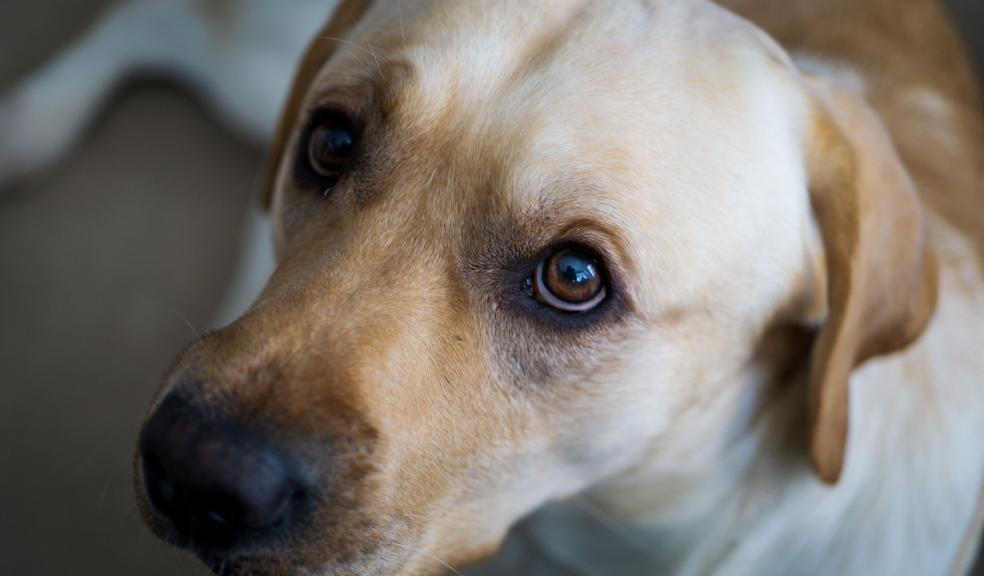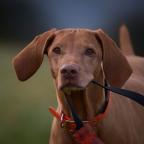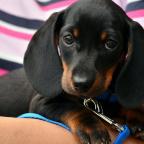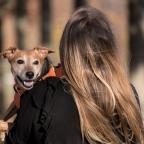
Signs Your Dog Is Feeling Stressed and Anxious in a Social Setting
When it comes to hosting the ultimate party for our pooches, we all want their tails to be wagging and happy smiles on their faces.
Although social events like birthdays are usually joyous occasions, they can sometimes be a bit overwhelming for our four-legged friends if there are lots of people they don't know, loud noises and things that disrupt their daily routine.
With almost three in five (59%) of dog owners across the UK celebrating their dog's birthdays, behaviourist Carolyn Menteith at tails.com has shared the signs that your four-legged friend is feeling overwhelmed in a social setting, as well as sharing some helpful ways to help your dog feel a bit more relaxed.
Why do dogs become stressed in social situations?
Like humans, dogs can become stressed when there are changes to their regular routine that they are unfamiliar with. Social events, even well-intended, can cause our dogs anxiety or even fear, if not managed properly.
Though some of our four-legged friends may enjoy being around their known pals, others are less social - especially with dogs they don't know well - which can cause fear, anxiety or them to act defensively.
Not only that but socialising with pals can often involve changes to our dog's usual environment, including unexpected sights, sounds, people, or locations that are unfamiliar to them.
Unlike humans, however, our canine companions can't tell us or voice their feelings when things become too much, so it's important to understand their body language and what the signs are to look out for when our dogs become stressed.
Signs of stressed-out pups to look for
-
Whining or barking
For some dogs, being vocal is a normal form of self-expression, but if they become anxious or fearful, normal vocalisations may be intensified.
This is an obvious clue to owners that something in their dog's environment is causing them unwanted stress.
-
Licking or Yawning
Dogs will often lick their lips after a treat or if they've smelt something they want to eat but lip or nose licking is often a subtle sign that your dog is feeling stressed or worried. This is an indication that things are getting a bit much and you should remove them from the situation or interaction that is causing them concern.
The same applies to yawning. Similar to humans, dogs will yawn when they are tired or have just woken up but yawning in other situations could indicate that they are experiencing stress with a situation or an encounter.
-
Avoidance or Hiding Behaviour
When socialising, a dog that feels overwhelmed may display deflecting, avoidance or 'escaping' behaviours. This may manifest itself in lots of ways that are designed to 'excuse themselves from an interaction - and different individuals, breeds or types have different ways of doing this (just as humans have ways of deflecting a 'party bore'!).
They might suddenly find an interesting scent that takes them off somewhere else. They might suddenly need to have a scratch. Or they might need to have a serious attack of the 'zoomies'. All of these are polite ways of ending an interaction that is getting overwhelming without resorting to any aggression.
Less socially adept dogs can resort to hiding behind owners or objects in order to avoid any interaction. While ignoring guests or their canine friends might seem rude, it's important to respect their choice and not force them to socialise - in fact this is a clear sign that the party might well be over.
-
Shake Offs
Watch your dog when they meet another dog - even if they are known to them. Very often after the other dog moves away, your dog will shake as if they were wet.
This behaviour is almost like 'shaking off' the meeting - and may well be a sign of low level stress or even a "phew... I'm glad that's over" sign. Or just a "right... that's over, what's next" gesture. Be aware of it as a potential sign of anxiety and that your dog might not be as happy to meet the other dog as you think.
How can you keep your dog relaxed when socialising?
-
Supervise all play and games
Carolyn Menteith, Behaviourist at tails.com says: "Do not expect your dog to be happy to meet everyone. It is far rarer for a dog to enjoy the company of every dog they meet, then it is for them to be wary of others or selectively social. Any party type situations need to be managed carefully to prevent dogs becoming overwhelmed or worried. Part of this involves making sure there is plenty of space so that dogs can get away from others when they need to.
If you think your dog is feeling stressed or overwhelmed, remove them from the situation or the encounter. Forcing them to continue to interact or 'face their fears' will just sensitise them and convince them they are right to be worried, and so store up problems for the future.
Even the most social of dogs should be given plenty of opportunities and the space to get away from other dogs in a multi-dog situation. The majority of the time, dogs should be on the lead and beside their owners, with play opportunities being in well-matched pairs or threesomes.
Watch that all play is 'equal' - in other words the dogs are taking turns to be the chaser and the chased, and that one isn't dominating the play or constantly overpowering the other.
Supervise all play and stop any games that are getting too rough.
Use crates or pens to give the dogs 'down time' and a safe space to relax.
-
Remove triggers that cause your dog's anxiety
"If your dog gets anxious and stressed around new dogs or people, then it's important to consider whether a low-key celebration for one, might be far more suitable. For most dogs, the chance to spend a day as the total focus of your attention is far more how they would choose to spend their special day. Parties are for owners, rarely for dogs!
"If you do want to invite your dog's friends round to socialise, then all the dogs in attendance should have met in a variety of situation, and know each other well."







